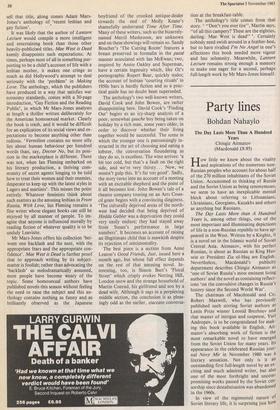Party lines
Bohdan Nahaylo
The Day Lasts More Than A Hundred Years Chingiz Aitmatov (Macdonald £8.95) How little we know about the vitality I land aspirations of the numerous non- Russian peoples who account for about half of the 270 million inhabitants of the Soviet Union. Accustomed to thinking of Russia and the Soviet Union as being synonymous, we seem to have an inexplicable mental block about referring to Lithuanians, Ukrainians, Georgians, Kazakhs and others as anything but Russians.
The Day Lasts More than A Hundred Years is, among other things, one of the most important and illuminating depictions of life in a non-Russian republic to have ap- peared in the West. Written by a Kirghiz, it is a novel set in the Islamic world of Soviet Central Asia. Aitmatov, with his perfect Russian, is about as Russian as King Hus- sein or President Zia ul-Haq are English.
Nevertheless, Macdonald's publicity department describes Chingiz Aitmatov as 'one of Soviet Russia's most eminent living authors' and the novel as containing reflect- ions 'on the convulsive changes in Russia's history since the Second World War'.
The chairman of Macdonald and Co, Robert Maxwell, who has previously published such stirring Soviet authors as Lenin Prize winner Leonid Brezhnev and that master of intrigue and suspense, Yuri Andropov, is to be congratulated for mak- ing this book available in English. Ait- matov's absorbing work of fiction is the most remarkable novel to have emerged from the Soviet Union for many years. Its appearance in the celebrated Russian jour- nal Novy Mir in November 1980 was a literary sensation. Not only is it an outstanding first full-length novel by an ex- citing and much admired writer, but also one of the most forthright and uncom- promising works passed by the Soviet cen- sorship since destalinisation was abandoned in the 1960s.
In view of the regimented nature of Soviet literary life, it is surprising just how
much Aitmatov has been allowed to get away with. The values he upholds and the sentiments he portrays have precious little in common with the canons of socialist realism. He touches on so many sensitive issues that the reader is sometimes under the impression he is reading a samizdat work, not a novel published with the state's approval. Yet the official reviews were com- plimentary. Moreover, the book has been promoted abroad and apart from English has already been translated into German and French.
Aitmatov himself' is an impressive but curious figure. Over the years he has gone further than most Soviet writers in condem- ning the horrors of the Stalin era and ex- amining social, cultural and philosophical questions raised by the Soviet experience. Despite his reputation as a bold and in- dependently minded 'liberal', he has skillfully managed to avoid getting into serious trouble and has risen to the heights of the Soviet establishment. He is a member of the Supreme Soviet of the USSR and sits on the editorial board of the influential Moscow newspaper Literaturnaya Gazeta. Besides writing prose, he is also a poet, Playwright and film-maker.
Writing in Russian as well as his native language, Aitmatov has become the best known representative of Soviet Central Asian literature. His works are permeated with a deep attachment to the cultural heritage of his and the other Turkic and traditionally Muslim people of the USSR. At the same time, they transcend ethno- centric concerns and deal with fundamental issues of universal significance. Conse- quently, he has a huge Soviet readership that eagerly await new works from him.
Aitmatov's novel revolves around a momentous 24-hour period in the life of an ageing Kazakh railway worker, Burannyi Yedigei, who lives in an isolated hamlet deep in the arid steppe. Death deprives him of his closest friend and colleague, the Patriarchal Kazangap. Determined to honour the old man's final wish, Yedigei Persuades unenthusiastic relatives and co- workers to make a day-long journey to bury Kazangap at an ancient Muslim cemetery. A bizarre funeral cortege sets out with Yedigei on a camel in front, followed by a tractor pulling a trailer containing the b°cIY, and an excavator for digging the grave at the rear. During the journey, Yedigei recalls his friendship with the deceased and the hard times they had lived through. He takes stock of his own life, Pausing to reflect on old legends of the region. After numerous flashbacks, the story reaches a powerful and unexpected climax at the burial ground. Interwoven into the narrative is a parallel science fiction theme about a joint secret US-Soviet space mission establishing con- tact with the inhabitants of a distant planet for the implications of this breakthrough 1,(3r Moscow and Washington. Although this sub-plot reinforces some of the points trade elsewhere in the novel, it does not
end with the rest and is distracting. On the whole, the writing is rich, at times poetic. John French has coped admirably with the difficult task of translation. Ait- matov excels in portraying natural sur- roundings and creating the appropriate at- mosphere. He probes deeply into the psychology of his main character and depicts convincingly the pent-up emotions which Yedigei has to live with.
The central theme of an ordinary, decent man searching for meaning and purpose in a harsh, unpredictable environment is perhaps familiar enough. But in a Soviet Central Asian context it takes on novel dimensions. Here the unrelenting forces of change unleashed by an alien, secular and collectivist system are destroying the tradi- tional way of life and uprooting the in- dividual. Acculturation or alienation are the price of modernisation and material progress. Modernity in a Soviet form, with its emphasis on political uniformity and • cultural homogeneity, is depriving man of his individuality. 'A man without a sense of history, without memory of the past', Ait- matov argues, 'lacks any perspective and lives only for the present, for the day'.
In a gruesome warning against dehumanisation and thought control, the like of which has not been seen in the Rus- sian language since Yevgeny Zamyatin's We was published in exile in 1924, the author recounts an ancient Kazakh legend about the 'mankurt'. It was the custom of the warlike Zhuan'zhuan nomads to transform their captives into docile slaves by destroy- ing their memory and identity in a singular- ly horrific manner. The heads of young prisoners would be shaved and then a wet camel skin stretched over their skulls. Bound hand and foot they would be left for days in the blistering sun until the camel skins dried and contracted. Those who sur- vived the unbearable pain lost their memories for ever and became mindless, totally subservient slaves, known as 'mankurts'. Towards the end of the novel Yedigei realises that Kazangap's son, a Sovietised and educated man for whom 'the plan is the plan', is a latter-day 'mankurt'.
Inevitably such a daring subject raises the thorny problems of nationalism, religion and respect for human freedoms. Ait- matov, in his carefully phrased foreword, condemns chauvinism and 'the myth of the superiority of one people over all others'. Although the novel is not anti-Russian as such, it is implicitly critical of the present Soviet nationalities policy which is aimed at 'fusing' together the peoples of the USSR into a Russian-speaking 'Soviet people'. The author advocates genuine equality and mutual respect between the nationalities, and toleration for the religious convictions and cultural traditions of individuals. His message comes over loud and clear: 'People can be patient with each other, but they cannot think the same... '.















































 Previous page
Previous page